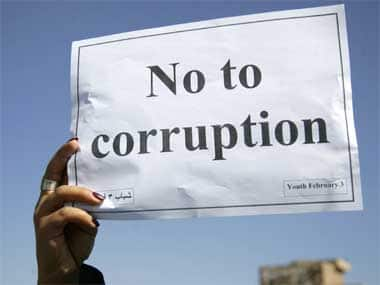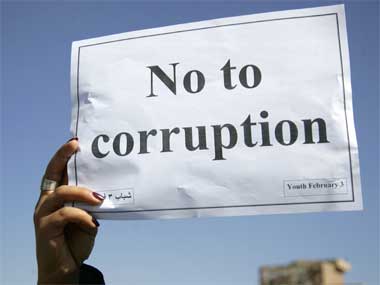The committee drafting the Lokpal Bill on Monday contemplated hard on confiscating properties of government officials earned as gratification or acquired as a result of corrupt practices. That there’s some serious discussion on bureaucratic corruption is afoot is heartening. But it is also surprising that it is happening so late in the day. The country has been discussing the issue for ages. Seizure of ill-gotten wealth should have been the first step towards combating corruption. It acts as a deterrent besides deincentivising the act of accepting or demanding favours. Obviously, the politician-bureaucrat nexus was at work to scuttle any such move. It is a reasonable move, at least more reasonable than the ‘death for graft’ call by Baba Ramdev. If the yoga guru’s demand is taken seriously, very few people will be left to man our government offices; also, it is possible the guru would have very few followers left. On a serious note, magnifying the risk aspect will kill the urge to get one’s hands dirty. So far, corruption has been a ’low risk-high return’ proposition. According to the National Crime Records Bureau, the conviction rate in corruption cases nationwide was 60 per cent in 2009, a big improvement on 20 per cent in 2000 and 17 per cent in 2001, but there’s still a long way to go. Most of those convicted are small fries who failed to afford good legal brains to put up a strong defence. There is no numerical data available yet, but it is obvious that big ticket culprits, including those in the top-middle and top rungs of the bureaucracy and politics, rarely get punished. The provisions under the Prevention of Corruption Act have not been effective in containing graft. Simply because it either intentionally or unintentionally provides many escape routes to the culprits. Also, there has been lack of will to pursue and prosecute the guilty. According to the NCRB data, properties worth Rs 193 crore have been seized between 1999 and 2009 – that is just about the price of 125 two-bedroom flats in decent localities in Mumbai. Clearly, it’s peanuts given the level of corruption the country is steeped in. Things would certainly change if seizure of properties becomes the first step in tackling such cases. [caption id=“attachment_14700” align=“alignleft” width=“380” caption=“A staggering 91 per cent of reported bribe demands originate from government officials in the country. Khaled Abdullah Ali Al Mahdi/Reuters”]
 [/caption] Declaration of assets by government officials – it still faces a lot of resistance in the Centre itself. Not long ago Prime Minister Manmohan Singh threatened to put up names of officials, many of the rank of secretary, not disclosing their assets on the government’s website — and constant evaluation of wealth amassed by them would help. This applies to politicians too. Leaders contesting elections declare their assets these days but they are not obliged to detail out how their wealth shot up 100-fold, if it did, between the elections. But let’s focus on bureaucrats for now. A staggering 91 per cent of reported bribe demands originate from government officials in the country, according to the
survey
. More than half of all the bribes were paid to get work done on time, it further says. The entire debate on corruption so far has portrayed politicians as the villains. But the fact is corruption happening in government offices on a daily basis over a long period is far bigger than any Rs 1,76 lakh crore swindle of the country. The 2G scam is astounding in its size, but think of the money changing hands in all offices in the country down from the level of peons to top officers on a regular basis. What makes such corruption worse is it affects daily lives of ordinary people and their weak budgets. And consider the delay. If people are paying bribes to get things done in time, it has to with the powers of the bureaucracy to keep things hanging through many subterfuges. The largely unacknowledged Right to Services Act introduced by Nitish Kumar, Chief Minister of Bihar, is interesting in this context. Under the act, government servants have to provide services – birth registration certificates, post-mortem reports, fixing a defective electricity connection, clearing a file etc – within a specified time-frame. They have to pay a penalty or face jail in case of repeat offence if the services are not delivered within a specified period. The civil society activists must look to address the problems of the common man through such initiatives. Taking on the political class is okay, but they would appear more serious if they confront the bureaucracy head on. It’s a far more difficult job.
[/caption] Declaration of assets by government officials – it still faces a lot of resistance in the Centre itself. Not long ago Prime Minister Manmohan Singh threatened to put up names of officials, many of the rank of secretary, not disclosing their assets on the government’s website — and constant evaluation of wealth amassed by them would help. This applies to politicians too. Leaders contesting elections declare their assets these days but they are not obliged to detail out how their wealth shot up 100-fold, if it did, between the elections. But let’s focus on bureaucrats for now. A staggering 91 per cent of reported bribe demands originate from government officials in the country, according to the
survey
. More than half of all the bribes were paid to get work done on time, it further says. The entire debate on corruption so far has portrayed politicians as the villains. But the fact is corruption happening in government offices on a daily basis over a long period is far bigger than any Rs 1,76 lakh crore swindle of the country. The 2G scam is astounding in its size, but think of the money changing hands in all offices in the country down from the level of peons to top officers on a regular basis. What makes such corruption worse is it affects daily lives of ordinary people and their weak budgets. And consider the delay. If people are paying bribes to get things done in time, it has to with the powers of the bureaucracy to keep things hanging through many subterfuges. The largely unacknowledged Right to Services Act introduced by Nitish Kumar, Chief Minister of Bihar, is interesting in this context. Under the act, government servants have to provide services – birth registration certificates, post-mortem reports, fixing a defective electricity connection, clearing a file etc – within a specified time-frame. They have to pay a penalty or face jail in case of repeat offence if the services are not delivered within a specified period. The civil society activists must look to address the problems of the common man through such initiatives. Taking on the political class is okay, but they would appear more serious if they confront the bureaucracy head on. It’s a far more difficult job.
Everyday corruption in govt offices beats 2G by a mile
Akshaya Mishra
• May 24, 2011, 15:36:18 IST
The money involved in corruption in government offices is far bigger than the amount involved in the 2G scandal. Worse, it affects the common man directly. The civil society must shift attention to this.
Advertisement
)
End of Article